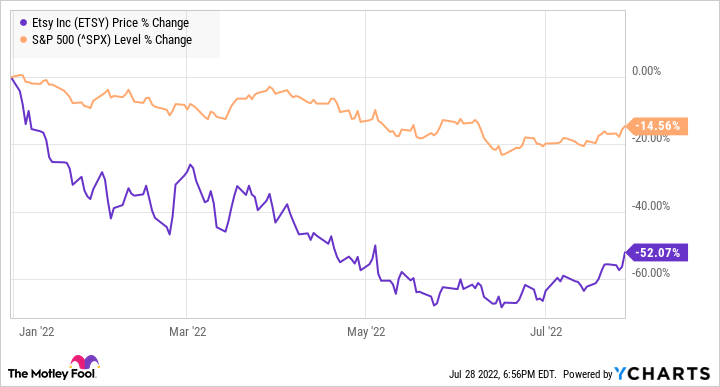E-commerce giant Etsy (ETSY -2.17%) impressed investors with its second-quarter results -- so much so that the company's shares soared on the heels of its update. That's in stark contrast to many other companies that headed south during a busy earnings week.
Despite the jump, Etsy's shares are down by 52% over the trailing-12-month period. However, the company's strong second-quarter performance shows good reasons to stick with the tech company -- although important challenges remain. Should investors pick up Etsy's shares following its latest quarterly update?
Growth has slowed, but there are encouraging signs
Etsy and other e-commerce companies benefited from a pandemic-fueled surge, a tailwind that has subsided. That's partly why Etsy is not recording the same growth rate as last year. Etsy's revenue increased by 10.6% year over year in the second quarter to $585.1 million. That's not as impressive a jump as it had gotten investors accustomed to, but it is slightly more than double the growth rate it recorded during the first quarter.
Etsy's gross merchandise volume (GMS) for the quarter -- the total value of the orders placed on its platform -- dropped by 0.4% to $3 billion. While this isn't good news for the company, it is hardly surprising. A complex macroeconomic environment and geopolitical tensions contributed to a decrease in consumer spending that affected Etsy's GMS.
In other bad news for Etsy, the company's net income dropped by 25.6% to $73.1 million. Management attributed the decline to an increase in expenses, especially salary-related expenses, as the company's increased its employee count.
On the other hand, Etsy continues to increase buyers and sellers on its platform. Active buyers grew by 3.8% to 93.9 million, and active sellers jumped by 41.5% year over year to 7.4 million.
Last but not least, Etsy's adjusted earnings before taxes, expenses, depreciation, and amortization (EBITDA) margins jumped by two percentage points to 68% during the period -- another good sign for its business.
Look beyond pandemic-related dynamics
The coronavirus pandemic impacted consumer activity in ways that benefited Etsy initially, but it also made year-over-year comparisons difficult for the e-commerce platform. Further, there are now factors entirely outside of Etsy's control (inflation, geopolitical tension, etc.) that are also impacting consumer spending.
The past two and a half years are an anomaly. So to determine whether Etsy is worth buying and holding for years, it's essential to focus on its prospects beyond everything that has happened recently and continues to happen but won't last forever.
The company's strong, growing moat may be the best reason to consider investing in Etsy. While the e-commerce industry is highly competitive, Etsy is primarily concerned with a small niche of this sector that deals with vintage and handmade goods. The advantage of this strategy is that Etsy has become the go-to place to exchange such goods, and buyers or sellers of these items will continue to flock to its platform.
Etsy benefits from the network effect -- the value of its platform will increase as more people use it. Meanwhile, despite the recent struggle the industry has encountered, e-commerce is on an unstoppable long-term upward trend.
The growth of digital payments increased internet penetration around the globe, and higher consumer spending will all contribute to shifting valuable transactions from brick-and-mortar channels to online platforms. According to some projections, the e-commerce sector will be valued at around $7.45 trillion by 2030, compared to just $3.86 trillion in 2021 -- clocking in at a compound annual growth rate of 7.6% through the end of the decade.
Vintage and handmade goods only make up a fraction of this total, but sales of these items will also follow the same upward pattern. That means a higher GMS, revenue, and profits for Etsy. The company's stock performance should follow suit.
That's why it's far too early to give up on Etsy. The company is still well positioned to reward its shareholders with market-beating performances.






